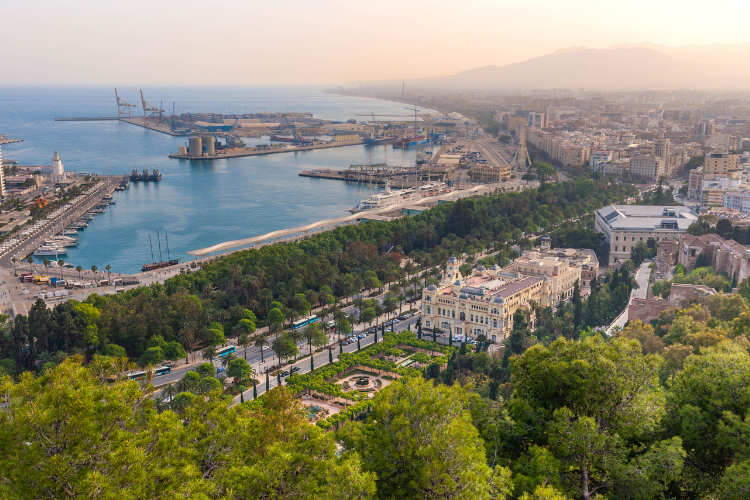Last Updated on October 28, 2024 by Laila Oliveira
Why does Spain qualify as one of the best European countries to retire in? Is it its safety and healthcare? Or the quality of life and affordability? Or the famous citizenship by investment program? Let’s go through this guide together to learn all you need to know to retire in Spain in 2024!

Why should you retire in Spain?
Spain offers an attractive retirement destination for many reasons.
Its warm Mediterranean climate, stunning landscapes, and vibrant culture make it a desirable place to spend one’s golden years.
The country also boasts a high quality of life, with a relaxed lifestyle, delicious cuisine, and a strong sense of community.
In addition to its lifestyle benefits, Spain provides practical advantages for retirees.
The cost of living is generally lower than in many other Western European countries, allowing pensioners to stretch their savings further.
Spain also has a well-developed infrastructure, with excellent healthcare facilities and efficient public transport systems. The key reasons to consider retiring in Spain include:
- Pleasant climate and beautiful scenery
- Rich cultural heritage and lifestyle
- Lower cost of living compared to other Western European countries
- High-quality healthcare system
- Well-developed infrastructure and transportation
- Established expat communities
- Opportunities for travel and exploration within Europe
Moreover, Spain is home to sizable expatriate communities, particularly in coastal areas such as the Costa del Sol and Costa Blanca.
This allows retirees to connect with like-minded individuals and build a social network in their new home. Spain’s central location within Europe also makes it an ideal base for exploring the continent, with easy access to neighboring countries via air, rail, or road.
Who can retire in Spain?
Spain welcomes retirees from diverse backgrounds, with different requirements for EU and non-EU citizens.
European Union citizenship grants individuals the right to live, work, and retire in any member state, including Spain, without the need for a visa or special permission.
However, non-EU citizens must navigate a more complex process to secure the necessary documentation and meet specific criteria to retire legally in Spain.
EU Citizens
As an EU citizen, you have the right to retire in Spain without needing a visa or special permission.
This freedom of movement is one of the key benefits of European Union citizenship. It allows you to choose Spain as your retirement destination with minimal bureaucratic hurdles.
| Requirement | EU Citizens |
|---|---|
| Visa | Not required |
| Residency | Automatic right to reside |
| Healthcare | Access to public healthcare system |
| Pension | Can receive pension from home country |
To retire in Spain as an EU citizen, you simply need to register with the local authorities.
You must also provide proof of sufficient income or savings to support yourself.
Furthermore, you will also have access to the Spanish public healthcare system. This ensures you receive the necessary medical care during your retirement years.
Non-EU Citizens
Non-EU citizens who wish to retire in Spain must meet specific requirements and obtain the necessary documentation. They need to consider studying the available visa options, which they can apply for through a Spanish Consulate that represents the Spanish Government.
The most common route is to apply for a non-lucrative visa. The non-lucrative visa is a residence visa which allows individuals to reside in Spain without the right to work. To qualify for this non-lucrative visa or residence visa, applicants must demonstrate sufficient financial means to support themselves, such as a pension, savings, or investments. These factors are important to receive a non-lucrative visa as you transfer to live to the Spanish city of your choice.
Retiring in Spain for expat retirees might be a bit of a hassle, however, expat retirees from other European countries, or beyond, may be rest assured that Spanish retirement visas are there for them to apply to. Should they find it a bit tiring to do so, Viv Europe is here to assist.
The requirements for non-EU citizens to retire in Spain include:
- Obtaining a non-lucrative visa
- Proving sufficient financial means to support oneself
- Securing private health insurance
- Passing a background check
- Providing a medical certificate of good health
Non-EU retirees must also navigate the complexities of international taxation and healthcare. As you try to retire in Spain into the Spanish city of your choice, you may also want to consider applying for private insurance.
Seeking advice from financial advisers and legal professionals specializing in international retirement can help ensure a smooth transition to retired life in Spain.

Spain Retirement Visa
Non-EU citizens who dream of retiring in Spain must obtain a retirement visa.
It is also known as a non-lucrative visa. The non-lucrative visa allows individuals to reside in Spain without the right to work, provided they meet certain financial and legal requirements.
To qualify for a Spanish retirement visa, applicants must demonstrate sufficient financial means to support themselves during their stay in the country. This includes:
| Requirement | Description |
|---|---|
| Pension or passive income | A minimum monthly income of more than €2,400 |
| Savings account | A balance of at least €25,000-€30,000 |
| Private health insurance | Comprehensive coverage with no copayments |
In addition to financial requirements, applicants must also provide a clean criminal record and a medical certificate confirming good health.
The Spain retirement visa is initially granted for a one-year period and can be renewed for two-year intervals. This is in the condition that the retiree continues to meet the necessary criteria.
Golden Visa
Another visa that you might consider is the Spain Golden Visa.
The Spain Golden Visa path offers a route to residency for investors looking to make significant investments in Spain with the objective of obtaining citizenship.
This program is ideal for those interested in both investment prospects and residency advantages.
Eligibility for Spain’s Golden Visa
Non-EU citizens who plan to invest in Spain to acquire citizenship can apply for the Golden Visa. The qualifying investments include:
- Real Estate Investment: A minimum investment of €500,000 in Spanish property, whether residential, commercial, or land, qualifies you for the Golden Visa.
- Business Investment: Starting a new business or purchasing an existing one that generates jobs or has a considerable economic impact can make you eligible for the program.
- Financial Investment: Investing in Spanish government bonds, shares in Spanish companies, or investment funds are other options that qualify. These investments generally start at a minimum of €1 million.
VIV Europe is here to guide you through the Golden Visa application process, ensuring a smooth journey to residency in Spain.
How is the healthcare for retirees in Spain?
Spain boasts a high-quality healthcare system that caters to the needs of retirees.
The country offers both public and private healthcare options. This ensures access to essential medical services. Retirees from EU countries can benefit from the European Health Insurance Card (EHIC).
It provides coverage for emergency treatment during temporary stays in Spain.
For those planning to retire permanently in Spain, it is crucial to understand the healthcare requirements and options available:
- EU retirees can access the public healthcare system by registering with the local authorities and obtaining a Spanish social security number.
- Non-EU retirees must secure comprehensive private health insurance to qualify for the Spain retirement visa.
- Private healthcare plans offer a wider range of services, shorter waiting times, and the option to choose English-speaking medical professionals.
Retirees in Spain can expect access to modern medical facilities, well-trained healthcare professionals, and a wide range of specialist services.
Many hospitals and clinics are in popular retirement destinations. This includes the Costa del Sol and Costa Blanca, catering specifically to the expatriate community and providing services in English and other languages.
How much money do you need to retire in Spain?
The amount of money needed to retire comfortably in Spain depends on various factors. It includes your desired lifestyle, location, and personal preferences.
To determine the financial resources required, it is essential to consider the cost of living, real estate prices, and expenses related to dining and entertainment.
You can create a realistic budget and ensure you have sufficient funds to enjoy your retirement years in Spain.
The cost of living
The cost of living in Spain is generally lower than in many other Western European countries, making it an attractive retirement destination.
However, expenses can vary significantly depending on the region and lifestyle choices.
Retirees should budget for housing, utilities, groceries, dining out, transportation, and leisure activities when planning their retirement in Spain.
The cost of real estate
Real estate prices in Spain vary depending on the location and type of property.
Coastal areas like the Costa del Sol and Costa Blanca tend to have higher property values due to their popularity among international buyers.
In contrast, inland regions and smaller towns often offer more affordable housing options for retirees.
The cost of dining and entertainment
Spain is renowned for its vibrant dining scene and diverse entertainment options. It can be enjoyed at reasonable prices.
Retirees can indulge in delicious tapas, fresh seafood, and local wines without breaking the bank, as dining out is often more affordable compared to other Western European countries.
Many cities and towns offer various cultural events, festivals, and leisure activities that cater to various interests and budgets.
Let’s Move to Europe
With Viv Europe your plans for Europe will come to a reality
How is the banking system in Spain?
Having a sufficient understanding of the banking system is a crucial aspect of retiring in Spain.
Understanding the process of opening a bank account and obtaining a NIE Number is essential. These ensure a smooth transition and managing your finances effectively.
Spain offers a well-developed banking infrastructure, with both local and international banks catering to the needs of expatriates and retirees.
By familiarizing yourself with these key elements, you can establish a solid financial foundation for your retirement in Spain.
Opening a bank account
Opening a bank account in Spain is a straightforward process for retirees.
Expats can choose from various local and international banks, many of which offer services tailored to the needs of foreign residents.
To open an account, retirees typically need proof of identity, such as a Passport and their NIE number.
NIE Number
A NIE (Número de Identidad de Extranjero) is a tax identification number that all foreign residents in Spain must obtain. This number is essential for various administrative tasks, such as opening a bank account, buying property, and filing taxes.
To obtain a NIE number, retirees must submit an application to the local police station or foreigner’s office, along with the required documentation:
| Document | Purpose |
|---|---|
| Passport | Proof of identity |
| Application form (EX-15) | An official request for NIE |
| Proof of address | Confirming residence in Spain |
| Fee payment | Administrative costs |
Once the application is processed, retirees will receive their NIE number, which is a crucial step in establishing their financial presence in Spain.
What are the taxes for retirees in Spain?
Retirees in Spain must navigate the country’s tax system, which includes income tax, wealth tax, and capital gains tax.
The Spanish taxes a resident on their worldwide income, while non-residents are only taxed on income earned within Spain. This may also include sources of passive income if applicable.
The tax rate for retirees depends on their income level, ranging from 19% to 45%.
Retirees should also be aware of the double taxation treaties between Spain and their home country.
These treaties help avoid paying taxes on the same income in both countries. For example, the tax treaty between Spain and the United Kingdom ensures that UK pensions are only taxed in the United Kingdom, not in Spain.
Seeking advice from a financial adviser or tax professional specializing in international taxation can help retirees optimize their tax efficiency and ensure compliance with Spanish tax regulations.
They can provide guidance on tax residency status, tax returns, and strategies to minimize tax liabilities while enjoying retirement in Spain.
How to move retirement funds, pensions, and social security contributions to Spain?
Retirees moving to Spain must carefully consider how to transfer their retirement funds, pensions, and social security contributions.
For UK retirees, Qualifying Recognised Overseas Pension Schemes (QROPS) allows the transfer of UK pensions to Spain without incurring tax penalties. Retirees should consult with a financial advisor to ensure the QROPS provider complies with Spanish regulations. Spain tax residents to ensure that they are not hiding any un-regulated wealth or other foreign assets that must be declared unto the Spanish government.
EU retirees can continue receiving their state pensions in Spain. This is all thanks to the coordination of social security systems within the European Union.
They must inform their home country’s pension authority of their move to Spain and provide the necessary documentation to ensure the smooth transfer of pension payments.
Non-EU retirees should investigate their home country’s social security agreements with Spain to determine how their pensions and contributions will be handled.
In some cases, retirees may be able to transfer their pension funds to a Spanish bank account. In others, they may continue receiving payments from their home country.
Seeking professional advice from a financial advisor specializing in international retirement can help navigate the complexities of moving retirement funds to Spain.
Viv Europe is here to guide you through the process of ensuring that your retirement in Spain is smooth and flawless.
Best Places To Retire In Spain
Spain offers a diverse range of attractive locations for retirees, each with its unique charm, culture, and lifestyle benefits.
From the vibrant cities of Madrid and Valencia to the sunny coastal towns of Alicante and Málaga, retirees can find the perfect place to call home.
Seville, with its rich history and stunning architecture, is another popular choice for those seeking an authentic Spanish experience.
In the following sections, we will explore these top retirement destinations in more detail, highlighting the key features that make them appealing to retirees from around the world.

Valencia
Valencia, Spain’s third-largest city, offers retirees a perfect blend of urban amenities and coastal charm.
With its stunning beaches, vibrant cultural scene, and delectable cuisine, Valencia provides an exceptional quality of life for those seeking an active retirement.
Valencia, from the city center to its old quarters boast the rich culture not just of Valencia, but also of Spain itself. Their rich culture is attractive to many expats, whether from EU or not, to consider Spanish citizenship and acquire a Spanish retirement visa.
This may also include people who are considering to explore Spain who, eventually, aim to be granted with Spanish citizenship. However, it is worth taking note of the fact that the Spanish tax residents to ensure that their bank statements and other foreign assets are clear of any suspicion
Furthermore, the Spanish tax residents for other assets, such as their real estate (based on property prices), passive income sources, among others.
Madrid
Madrid, Spain’s vibrant capital, is an attractive option for retirees seeking a cosmopolitan lifestyle.
The city boasts world-class museums, stunning architecture, and a thriving culinary scene.
With its excellent public transportation system and high-quality healthcare facilities, Madrid offers retirees a comfortable and convenient retirement destination.
Seville
Seville, the enchanting capital of Andalusia, captivates retirees with its rich history. It is well-known for its majestic architecture and vibrant culture.
This picturesque city offers a laid-back lifestyle and a warm climate. It also boasts an abundance of leisure activities, making it an ideal retirement destination for those seeking an authentic Spanish experience:
- Immerse yourself in Seville’s fascinating history, from the majestic Alcázar palace to the awe-inspiring Seville Cathedral
- Enjoy the city’s lively tapas scene and savor delicious local cuisine in the city center.
- Experience the passion and artistry of flamenco, Seville’s iconic dance
- Explore the charming neighborhoods of Santa Cruz and Triana, filled with colorful houses and quaint cobblestone streets along the city center and other parts of Seville.
Alicante
Alicante, a charming coastal city on the Costa Blanca, is a popular retirement destination for its sunny weather, stunning beaches, and relaxed Mediterranean lifestyle.
The city offers a wide range of amenities, including excellent healthcare facilities, shopping centers, and leisure activities, making it an ideal place for retirees to enjoy their golden years.
- Bask in the warm Mediterranean climate, with over 300 days of sunshine per year
- Explore the pristine beaches of Playa del Postiguet and Playa de San Juan
- Discover the rich history and culture of Alicante, from the iconic Santa Bárbara Castle to the colorful Old Town and the city center
- Savor delicious local cuisine, including paella, fresh seafood, and the famous Alicante wine
Málaga
Málaga, the vibrant capital of the Costa del Sol, is a sought-after retirement destination known for its mild climate, beautiful beaches, and rich cultural heritage.
This Andalusian city offers retirees a perfect blend of modern amenities and traditional Spanish charm:
- Enjoy the warm, subtropical climate and stunning coastline
- Immerse yourself in Málaga’s fascinating history, from the ancient Roman theater to the Moorish Alcazaba fortress
- Experience the city’s thriving art scene, with world-class museums like the Picasso Museum and the Carmen Thyssen Museum
- Indulge in delicious local cuisine, including fresh seafood, tapas, and sweet Málaga wine
Do you need help to retire in Spain?
Spending your advanced adult years never has to be confusing, especially if you’ve chosen Spain as your place of retirement.
You don’t want to deal with tiresome procedures at this point in your life. You would rather focus on other aspects of settling in another country!
Allow Viv Europe to handle all your retirement needs and streamline and lessen the stress of this process. Book a consultation with us today for help with everything from applying for the Spain non-lucrative visa to finding your new home.








